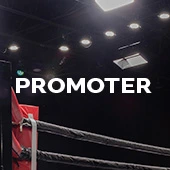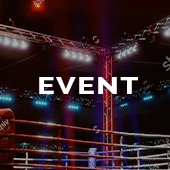In the recent Netflix documentary Matchroom: The Greatest Showmen, there was an understandable focus placed on the following stars: Anthony Joshua, Katie Taylor, Conor Benn, Ronnie O’Sullivan and Luke Littler. These stars, across three different sports, represent some of the biggest names with whom Matchroom currently work and therefore their presence in the six-part documentary was to be expected.
One man whose presence was a surprise, however, was Johnny Fisher. Yes, that Johnny Fisher.
Fisher, unlike Joshua, Taylor, O’Sullivan and Littler, is not a world champion, nor, unlike Benn, is he the son of a famous fighter whose own infamy now precedes him. Instead, Fisher is a humble heavyweight boxer whose greatest triumph to date is winning the Southern Area title in 2023. His father, John Senior, is famous – that is, social-media famous – but not because he once boxed professionally or captured the imagination of the British public in the 1990s. He is famous simply because of a catchphrase and because of the relish with which he orders Chinese takeaways and devours monosodium glutamate.
In other words, Johnny Fisher’s role in the aforementioned documentary came out of leftfield. Some, in fact, would argue that he has yet to earn it: the attention, the recognition, the stage. They would point to his recent defeat to Doncaster’s Dave Allen as proof of this and indeed proof that the documentary erred by giving him so much airtime.
And yet, to think like that, is to miss the point. The point is, Johnny Fisher became a focus of The Greatest Showmen because, like it or not, he, more than most British boxers, embodies the show’s title. He is, to some extent, one of the last great ticket-sellers in the sport, Fisher, and is a man who, along with his father, understands and still practises the art of selling and showing up.
That’s why The Greatest Showmen was happy to tilt the spotlight in his direction for a couple of episodes. It’s also why Frank Smith, the Matchroom Boxing CEO, was so passionate about preaching Fisher’s virtues to his boss, Eddie Hearn, and making sure the “Romford Bull” got his chance with Matchroom.
“It’s always a fine balance between a fighter being able to sell tickets and them being able to focus on their career,” Smith told BoxingScene. “I always think back to people like Kevin Mitchell [a former two-time world title challenger at lightweight] as an example. He sold a huge amount of tickets, but he was in the pubs and it probably didn’t help his career in the long run.
“With the likes of Johnny Fisher, it’s relatable. He is around his fans nonstop. That builds a real relationship with people. He has the links to his community and his whole family are just nice people. Sometimes you can be too far away from reality, but he has managed to become a big star while maintaining his roots.
“As much as it is important for a fighter to be good, if you are going to be a commercial star at the same time you need to do the work on the outside. A lot of fighters don’t get that part of it. To work with someone like Johnny is a breath of fresh air. He is willing to go and do anything and be at any event. He puts the work in.”
Watching the documentary, it was clear that Smith believed in Fisher – both in terms of his selling potential and his ability in the ring. However, as is often the case with a documentary, it became difficult to take seriously what we were watching and hearing on screen while armed with knowledge those speaking on screen at the time, through no fault of their own, lacked. For instance, we, the audience, knew that Fisher, despite his prominence in the documentary, was not going to come out of the rivalry with Dave Allen with his reputation intact, much less enhanced. Instead, he would controversially win the first fight, which was featured in the doc, and then find himself stopped in five rounds by Allen in the rematch six months later.
“I’ll be completely honest: when we were originally talking about that [first] Dave Allen fight, I didn’t think Dave Allen should still be fighting,” admitted Smith. “I was against it. We’d seen Dave in some tough fights and I was very confident Johnny would win that fight.
“But the experience of Dave Allen showed. Dave has been in with so many great fighters, not just in fights but in sparring, and we saw evidence of that on the night. He [Allen] has really relit his career. Who would have ever predicted this a few years ago? He’s headlining on Saturday night and there will be nine thousand people there in the arena. It’s amazing to see. I was wrong for writing him off and saying he shouldn’t be in there. But he is proof that you should never be written off in this sport.”
The same night Fisher faltered, Allen, whose path Fisher has to some degree followed, managed to get back to his feet. He delivered himself an ultimatum beforehand – win or retire (again) – and showed that there is more to him, at the age of 33, than just making light of situations and himself. When the time came to get serious, for once Allen did.
Now, as a result of beating Fisher, Allen, 24-7-2 (19 KOs), adopts the role Fisher played in that Netflix documentary. He is a little less “bosh” and a little more damaged (vis-à-vis his experiences in the ring), but the same theory applies. On Saturday, in Sheffield, a crowd of 9,000 people will come out to watch Allen fight Arslanbek Makhmudov because they feel like they know him, and because they like him, and because they have been invested in his journey – the ups, the downs, the retirements, the comebacks. They will watch him because they feel closer to Dave Allen than they do to better fighters whose inability to connect keeps them at arm’s length.
“He’s not hiding anything,” said Smith of Allen. “So many people in this day and age don’t want to be honest and they give you only a version of themselves. But Dave has always been honest with everything he has done. That makes him endearing. He’s a real person who people can relate to. He has had his ups and downs throughout his career, and he has said things that have made people worry for him or think he shouldn’t be fighting anymore, but that’s what you go through in life – that’s what we all go through in life.
“He has never, up to this point, dedicated himself to the level he can. Now he knows this is his chance to become a star and change his life completely. Don’t get me wrong, he’s done well so far, but if he can win this fight on Saturday, and go on to fight a big name, that changes his life and his family’s life.”
If we know anything about cult heroes, it’s that there is no recipe or obvious blueprint for their creation. Some fighters just connect and find a flock of followers happy to travel the world with them, whereas others, even better fighters, toil away in relative silence and obscurity, often begrudging the popularity of the relatable crowd-pleaser. Some fighters, like Ricky Hatton, were born ticket-sellers, with their tribe already assembled, whereas others had to remain patient and went unfollowed for years before their city woke up to their success.
“I always look back at when we first signed [former WBC cruiserweight champion] Tony Bellew, about 13 years ago,” said Smith. “You look at what he went on to do – his last fights were on pay-per-view, he became a Hollywood star in the Creed films. But when we signed Tony Bellew and he sold just 900 tickets for a British title fight against Danny McIntosh, I would have said you’re mad if you told me what he was destined to go on to do. It’s the same with fighters like Josh Warrington and Leigh Wood.
“Outside of a fighter like AJ [Anthony Joshua], it’s a difficult sport to predict when it comes to pinpointing future stars. You just never know. But these guys we’re talking about today all have that likeability factor and they’re real. They’re real people. They’re not detached from reality. That’s one of the key things that sticks out for me.”
It’s not just Smith. Many others were alerted to Dave Allen’s personality in the early years and found themselves soon drawn to his story without really knowing why. Even Allen himself can’t explain it.
“I just stumbled onto Twitter one day by accident really and I was myself on there,” Allen said when asked about his popularity. “I’ve always been myself all the way through. I was very lucky that people liked me. I thought I was just the average twentysomething lad in Britain, but they were seeing me on the telly fighting some of the best fighters in the world. On top of that, when I got in the ring, yeah sometimes I was out of shape and sometimes I didn’t perform to my ability, but I always tried my best. I laughed and I smiled and I tried my best. I think people can relate to that.”
Although it seemingly has no place in a sport like boxing, especially these days, being real is the key to everything. Be real and people will like you, and follow you, and pay money to watch you fight. Be real and a documentary celebrating the successes of numerous world champions will make room for you and present you as the future of a billion-pound promotional company. Be real and people will go out of their way to help you.
Be real and you will also get chances. You will get second, third and fourth chances. You will get an endless amount of chances because being real, or human, is often, in the game of popularity, more beneficial than being great.
“Win this and he [Allen] puts himself in the position to get a big opponent next,” said Smith. “He delivers numbers and he delivers eyeballs. You can be the best fighter in the world, but if people aren’t interested in you, it makes it very difficult. With someone like Dave, he’s got it all.
“I also don’t think we’ve ever really seen the best Dave Allen. When you listen to what he says, and when you hear about what he used to do in the past, it can’t be the best version of him. But I think you’ll see that best version of him on Saturday night.”
Regardless of which version ultimately turns up, we can be sure of one thing: Dave Allen will and can only play himself.



